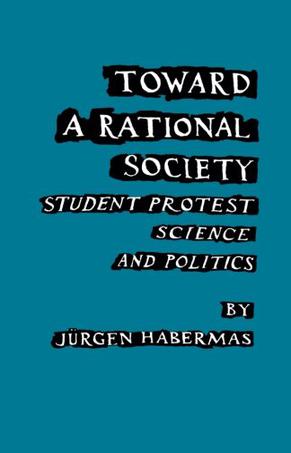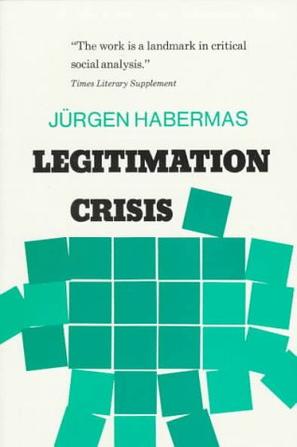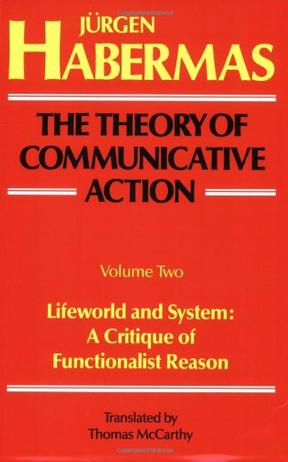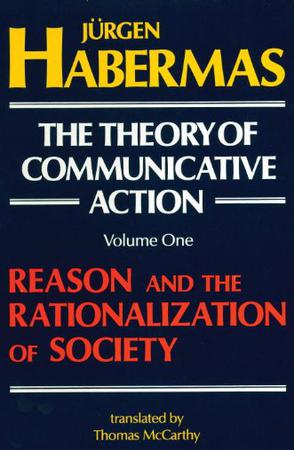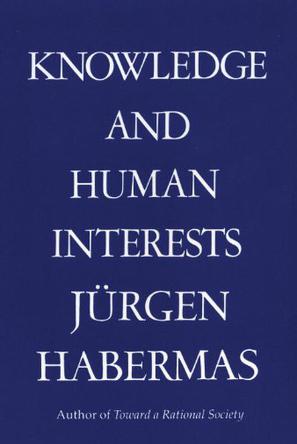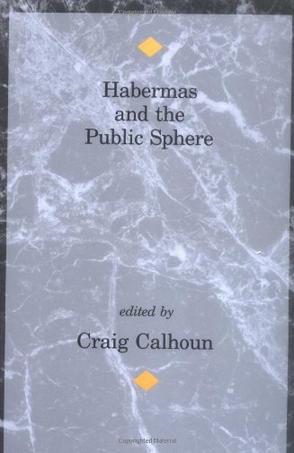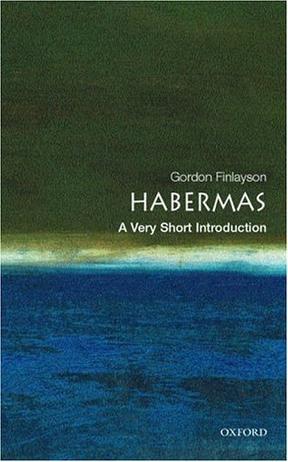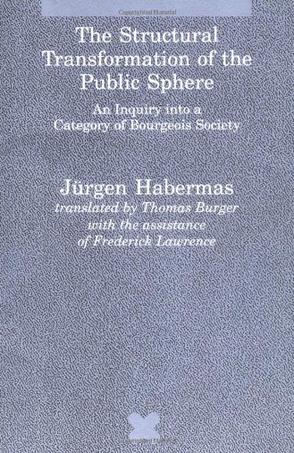欢迎来到相识电子书!
标签:Habermas
-
Toward a Rational Society
Knowledge, communication, action – These are the concepts central to all of Habermas's thought. As a philosopher, he is concerned with the rational connections of these concepts. As a sociologist, he is prepared to analyze with care the distortions of human interactions caused by existing social and political institutions. In a series of connected essays, the author assesses the function of the contemporary university, and sharply analyzes contemporary students and their political efforts. He then brilliantly analyzes as a communications model the relationships between research institutes and the political agencies which employ them. The book concludes with a complex discussion of technology and science as an "ideology," dedicated to Herbert Marcuse. Critical parts of Marcuse's thought, Habermas dissects contemporary democratic dialogue and offers an important preliminary sketch of a general theory of social evolution. He analyzes the difference between the technological sphere of control and the practical sphere of communication and interaction as the basic feature of human social life, and explains how and why the predominance of the technological sphere is the distinguishing and alienating characteristic of advanced industrial society. The concepts of depoliticization and the freeing of communication emerge as the crux of today's political situation. -
Legitimation Crisis
Critical Theory originated in the perception by a group of German Marxists after the First World War that the Marxist analysis of capitalism had become deficient both empirically and with regard to its consequences for emancipation, and much of their work has attempted to deepen and extend it in new circumstances. Yet much of this revision has been in the form of piecemeal modification. In his latest work, Habermas has returned to the study of capitalism, incorporating the distinctive modifications of the Frankfurt School into the foundations of the critique of capitalism. Drawing on both systems theory and phenomenological sociology as well as Marxism, the author distinguishes four levels of capitalist crisis - economic, rationality, legitimation, and motivational crises. In his analysis, all the Frankfurt focus on cultural, personality, and authority structures finds its place, but in a systematic framework. At the same time, in his sketch of communicative ethics as the highest stage in the internal logic of the evolution of ethical systems, the author hints at the source of a new political practice that incorporates the imperatives of evolutionary rationality. -
The Theory of Communicative Action
"One of the broadest, most comprehensive, elaborate and intensely theoretical works in social theory. Social theory and philosophy may never be the same again." (Philosophy and Social Criticism) -
The Theory of Communicative Action
A major contribution to contemporary social theory. Not only does it provide a compelling critique of some of the main perspectives in 20th century philosophy and social science, but it also presents a systematic synthesis of the many themse which have preoccupied Habermas for thirty years. --Times Literary Supplement -
Knowledge and Human Interests
"For those concerned with the relationships between thought and action, KNOWLEDGE AND HUMAN INTERESTS will quickly be recognized as a brilliant book -- and a bold outline for a new social theory." (Times Literary Supplement) -
Habermas and the Public Sphere
The relationship between civil society and public life is in the forefront of contemporary discussion. No single scholarly voice informs this discussion more than that of Jurgen Habermas. His contributions have shaped the nature of debates over critical theory, feminism, cultural studies, and democratic politics. In this book, scholars from a wide range of disciplines respond to Habermas's most directly relevant work, The Structural Transformation of the Public Sphere. From political theory to cultural criticism, from ethics to gender studies, from history to media studies, these essays challenge, refine, and extend our understanding of the social foundations and changing character of democracy and public discourse.Craig Calhoun is Professor of Sociology and History and Director of the Program of Social Theory and CrossCultural Studies at the University of North Carolina at Chapel Hill.Contributors: Hannah Arendt. Keith Baker. Seyla Benhabib. Harry C. Boyte. Craig Calhoun. Geoff Eley. Nancy Fraser. Nicholas Garnham. Jurgen Habermas. Peter Hohendahl. Lloyd Kramer. Benjamin Lee. Thomas McCarthy. Moishe Postone. Mary P. Ryan. Michael Schudson. Michael Warner. David Zaret. -
Habermas
Description * Provides a completely up to date and much-needed entry into the long and forbiddingly technical works of the most influential German philosopher alive today * Covers Habermas's influence on a wide variety of fields, including philosophy, political and social theory, cultural studies, sociology, and literary studies * Explains how Habermas's ideas are applied to present day social and political situations * Unlike other writings on Habermas, this explains his intellectual framework and technical vocabulary rather than simply adopting it This book gives a clear and readable overview of the philosophical work of Jurgen Habermas, the most influential German philosopher alive today, who has commented widely on subjects such as Marxism, the importance and effectiveness of communication, the reunification of Germany, and the European Union. Gordon Finlayson provides readers with a clear and readable overview of Habermas's forbiddingly complex philosophy using concrete examples and accessible language. He then goes on to analyse both the theoretical underpinnings of Habermas's social theory, and its more concrete applications in the fields of ethics, politics, and law; and concludes with an examination how Habermas's social and political theory informs his writing on contemporary, political, and social problems. =========================================== Contents Preface: Who is J?rgen Habermas 1. Habermas and Frankfurt School Critical Theory 2. Habermas's New Approach to Social Theory 3. The Pragmatic Meaning Programme 4. The Programme of Social Theory 5. Habermas's Theory of Modernity 6. Discourse Ethics I: The Discourse Theory of Morality 7. Discourse Ethics II: Ethical Discourse and the Political Turn 8. Politics, Democracy, and Law 9. Politics Beyond The Bounds Of The Nation Alone -
哈贝马斯:关键概念
于尔根•哈贝马斯是我们时代最伟大的思想家之一,是所谓后现代时期的“现代性问题”的思想巨擘。 《哈贝马斯:关键概念》,引领读者自由穿越由哲学、社会学、政治学、法律与文化理论共同构筑的庞大思想迷宫,为理解哈贝马斯这一当代最重要的社会理论家的主要思想提供了入门津梁。 -
后形而上学思想
《后形而上学思想》堪称哈贝马斯思想的浓缩。他以“形而上学之争”为切入点,集中阐明了他对英美语言哲学,特别是实用主义语义学(皮尔斯、塞尔、米德等)的批判与借鉴,以便在逻辑学与语义学之间辟一条语用学的路子,从普通语言学的角度为效行为理论提供有力的证明,破除传统理性的意识哲学前提。哈贝马斯主张,通过把主体间性的方法运用于意义与有效性、主体性间性的方法运用于意义与有效性、主体性与个体性等概念,真正的后形而上学思想既可以避免传统形而上学的“理性陷阱”,又可以保有启蒙里性的批判锋芒。 -
The Structural Transformation of the Public Sphere
This is Jurgen Habermas's most concrete historical-sociological book and one of the key contributions to political thought in the postwar period. It will be a revelation to those who have known Habermas only through his theoretical writing to find his later interests in problems of legitimation and communication foreshadowed in this lucid study of the origins, nature, and evolution of public opinion in democratic societies.
热门标签
下载排行榜
- 1 梦的解析:最佳译本
- 2 李鸿章全传
- 3 淡定的智慧
- 4 心理操控术
- 5 哈佛口才课
- 6 俗世奇人
- 7 日瓦戈医生
- 8 笑死你的逻辑学
- 9 历史老师没教过的历史
- 10 1分钟和陌生人成为朋友

